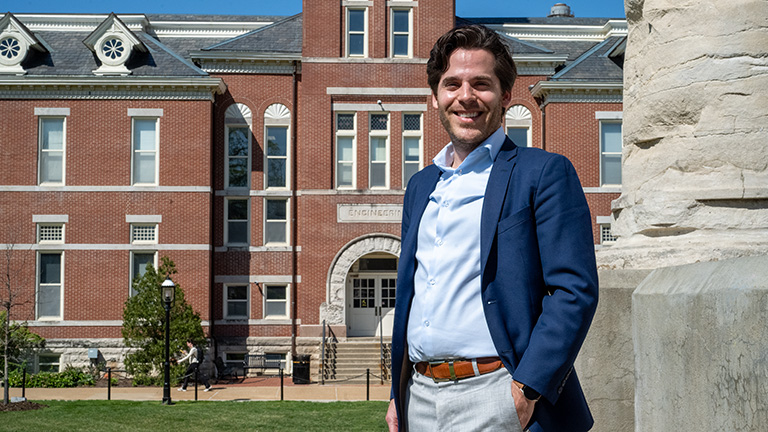May 14, 2025
A childhood fascination with how things work led Marc Canellas to study mechanical engineering and, ultimately, a career as a public defender.

The skills Mizzou Engineers learn extend far beyond technical know-how and make them highly sought after in many fields. Marc Canellas (BS ME ’12) applies his expertise to scrutinize the reliability of tools used in criminal justice. He recently took a moment to talk about his path from Mizzou to the Maryland Office of the Public Defender.
I represent people who are accused of crimes but can’t afford an attorney.
I am a public defender in a division specializing in forensic evidence, especially evidence generated through software, algorithms and artificial intelligence (AI). My job is either to introduce this type of evidence or to challenge it — arguing that it’s unreliable or that the person presenting it isn’t qualified to do so. When a piece of evidence doesn’t sound quite right, I force them to prove it. Or as we say in Missouri, “Show Me.”
I always wanted to understand how things work.
When I was a kid, my sister had a toy ambulance that had a siren and made other noises. I took it apart because I wanted to know how it worked. That’s what I do now, just in a courtroom. When the prosecution’s forensic analyst says, “The software says it was your client,” my response is the same as when I was a kid: “How?”
After Mizzou, I went to Georgia Tech for my PhD in aerospace engineering.
My PhD research in aerospace and cognitive systems engineering led me into thinking about autonomous weapons and facial recognition, which were just starting to take off in 2012. There were lots of concerns about bias, but my questions were: Does any of this even work? How do we govern it?
I was shocked to learn that unlike civil engineering, for example, where buildings have strict codes and standards, there were no comparable rules for AI — and still none today. That realization pushed me toward policy as a Congressional staffer and law as a public defender.
Criminal courtrooms are where the rubber meets the road.
Surveillance technology gets beta tested on Americans in criminal cases first. Often, it doesn’t work well, but it gets used anyway. I wanted to be the person standing next to someone being affected by that technology, helping them push back.
I’m a lawyer now, but I’ll always be an engineer first. My engineering training taught me to be skeptical, to question whether things actually work, not just whether they sound like they work.
I would love to help govern AI.
I want to ensure that AI is safe and effective for public use, particularly in high-stakes areas like criminal justice, health care and defense. I have technical understanding, legal expertise and policy experience. Public defenders govern AI one person at a time. We need people who can do it for the country.
Step outside the engineering school.
The biggest problems we face aren’t just engineering problems. For example, if you’re building an autonomous vehicle, you need to cross disciplinary boundaries. You have to understand how drivers think, pedestrians behave and what laws apply.
The most successful engineers I’ve met are technically skilled and know how to communicate, understand politics and navigate the complexities of machines and people. Technical skill alone is not sufficient. Understanding the broader world is key.
Apply critical thinking wherever you go. Become a Mizzou Engineer!